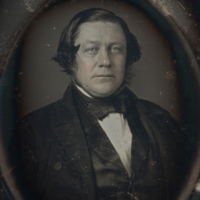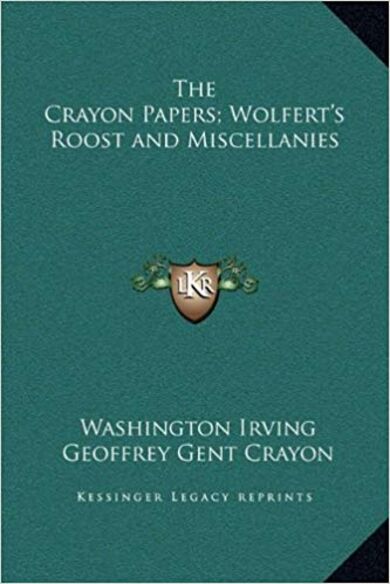To the Editor of the Knickerbocker.
Sir: I have already given you a legend or two drawn from ancient Spanish sources, and may occasionally give you a few more. I love these old Spanish themes, especially when they have a dash of the Morisco in them, and treat of the times when the Moslems maintained a foot-hold in the peninsula. They have a high, spicy, oriental flavor, not to be found in any other themes that are merely European. In fact, Spain is a country that stands alone in the midst of Europe; severed in habits, manners, and modes of thinking, from all its continental neighbors. It is a romantic country; but its romance has none of the sentimentality of modern European romance: it is chiefly derived from the brilliant regions of the East, and from the high-minded school of Saracenic chivalry.
The Arab invasion and conquest brought a higher civilization and a nobler style of thinking into Gothic Spain. The Arabs were a quick-witted, sagacious, proud-spirited, and poetical people, and were imbued with oriental science and literature. Wherever they established a seat of power, it became a rallying place for the learned and ingenious; and they softened and refined the people whom they conquered. By degrees, occupancy seemed to give them a hereditary right to their foothold in the land; they ceased to be looked upon as invaders, and were regarded as rival neighbors. The peninsula, broken up into a variety of states, both Christian and Moslem, became for centuries a great campaigning ground, where the art of war seemed to be the principal business of man, and was carried to the highest pitch of romantic chivalry. The original ground of hostility, a difference of faith, gradually lost its rancor. Neighboring states, of opposite creeds, were occasionally linked together in alliances, offensive and defensive; so that the cross and crescent were to be seen side by side fighting against some common enemy. In times of peace, too, the noble youth of either faith resorted to the same cities, Christian or Moslem, to school themselves in military science. Even in the temporary truces of sanguinary wars, the warriors who had recently striven together in the deadly conflicts of the field, laid aside their animosity, met at tournaments, jousts, and other military festivities, and exchanged the courtesies of gentle and generous spirits. Thus the opposite races became frequently mingled together in peaceful intercourse, or if any rivalry took place, it was in those high courtesies and nobler acts which bespeak the accomplished cavalier. Warriors of opposite creeds became ambitious of transcending each other in magnanimity as well as valor. Indeed, the chivalric virtues were refined upon to a degree sometimes fastidious and constrained; but at other times, inexpressibly noble and affecting. The annals of the times teem with illustrious instances of high-wrought courtesy, romantic generosity, lofty disinterestedness, and punctilious honor, that warm the very soul to read them. These have furnished themes for national plays and poems, or have been celebrated in those all-pervading ballads which are as the life-breath of the people, and thus have continued to exercise an influence on the national character which centuries of vicissitude and decline have not been able to destroy; so that, with all their faults, and they are many, the Spaniards, even at the present day, are on many points the most high-minded and proud-spirited people of Europe. It is true, the romance of feeling derived from the sources I have mentioned, has, like all other romance, its affectations and extremes. It renders the Spaniard at times pompous and grandiloquent; prone to carry the “pundonor,” or point of honor, beyond the bounds of sober sense and sound morality; disposed, in the midst of poverty, to affect the “grande caballero,” and to look down with sovereign disdain upon “arts mechanical,” and all the gainful pursuits of plebeian life; but this very inflation of spirit, while it fills his brain with vapors, lifts him above a thousand meannesses; and though it often keeps him in indigence, ever protects him from vulgarity.
In the present day, when popular literature is running into the low levels of life and luxuriating on the vices and follies of mankind, and when the universal pursuit of gain is trampling down the early growth of poetic feeling and wearing out the verdure of the soul, I question whether it would not be of service for the reader occasionally to turn to these records of prouder times and loftier modes of thinking, and to steep himself to the very lips in old Spanish romance.
For my own part, I have a shelf or two of venerable, parchment-bound tomes, picked up here and there about the peninsula, and filled with chronicles, plays, and ballads, about Moors and Christians, which I keep by me as mental tonics, in the same way that a provident housewife has her cupboard of cordials. Whenever I find my mind brought below par by the commonplace of every-day life, or jarred by the sordid collisions of the world, or put out of tune by the shrewd selfishness of modern utilitarianism, I resort to these venerable tomes, as did the worthy hero of La Mancha to his books of chivalry, and refresh and tone up my spirit by a deep draught of their contents. They have some such effect upon me as Falstaff ascribes to a good Sherris sack, “warming the blood and filling the brain with fiery and delectable shapes.”
I here subjoin, Mr. Editor, a small specimen of the cordials I have mentioned, just drawn from my Spanish cupboard, which I recommend to your palate. If you find it to your taste, you may pass it on to your readers.
Your correspondent and well-wisher,
GEOFFREY CRAYON.



